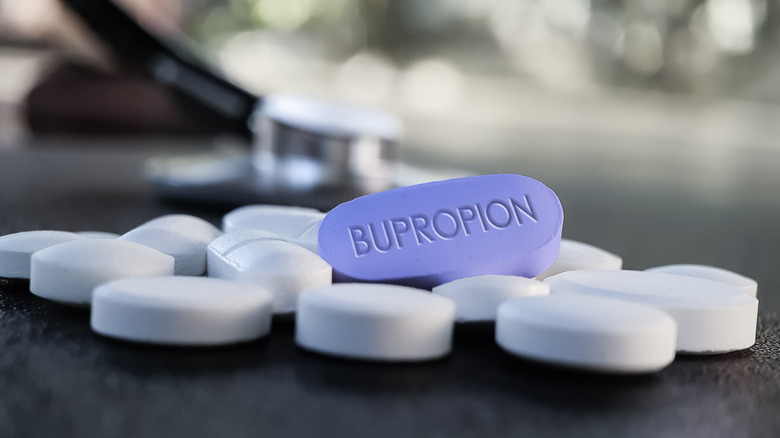Wellbutrin Explained: Usage, Dosage, And Side Effects
Every day, nearly 25 million Americans take a prescription called Wellbutrin (K Health). There are a number of symptoms or diagnoses that may prompt a physician to write a Wellbutrin script, but as with any unfamiliar drug, patients may want to be well-informed about a medication before adding it to their daily routine.
Other prescriptions, health history, treatment goals, and insurance are just a few of the things to consider when another medication may be incorporated into your life. Deciding on Wellbutrin will ultimately be up to the patient with guidance from their physician, but you may want to take some notes and gather some research in your own time before visiting with your doctor to make the final call. Here is everything you need to know about Wellbutrin before choosing it for your treatment plan, including which conditions it may be taken for, common side effects, the different versions of this drug, dosage, and more.
Wellbutrin is a name brand for bupropion hydrochloride
Wellbutrin is a name brand used to describe the generic medication bupropion hydrochloride, or just bupropion for short. Other names include: Aplenzin, Budeprion SR, Budeprion XL, Buproban, Forfivo XL, and Zyban (via Mayo Clinic). Bupropion, an aminoketone, is approved by the U.S. Food and Drug Administration (FDA) for treatment of multiple conditions, particularly depressive disorders. It is also used off-label to treat several other conditions — meaning that the drug has not been approved by the FDA specifically to treat those conditions, but doctors may still prescribe it (via Eleanor Health).
Bupropion is classified as an antidepressant — or more specifically, a norepinephrine-dopamine reuptake inhibitor (NDRI). This medication impacts the body by inhibiting serotonin, dopamine, and norepinephrine reuptake, correcting neurotransmitter imbalances in the brain. Reuptake describes a process where these hormones — which impact the brain's flight-or fight-response, reward system, and natural anxiety management — are prevented from being reabsorbed into the brain, which is what has large impacts on mood, pleasure sensations, learning, and memory, RxList says.
The history of Wellbutrin/bupropion
The medical community developed bupropion specifically to create a more tolerable antidepressant, according to a report in The Primary Care Companion to the Journal of Clinical Psychiatry. Despite Wellbutrin's side effects proving to be milder than those of existing drugs, the acceptance of bupropion has been touch and go over the years, says Psychiatric Times. Bupropion led the second generation of antidepressants as the first "modern" one to hit markets in 1985. The medication didn't last long before it was pulled due to a concerning amount of associated seizures, but by the time the dosage was reconfigured and the drug was re-released in 1989, another widely popular antidepressant — fluoxetine, known by its name brand Prozac — had been on the shelves for two years.
It was discovered that bupropion's earliest formulation was to blame for its correlation with seizures; the NDRI was originally prescribed as a three-times-daily immediate release formula, and patients who accidentally took their doses too close together were most likely to be at risk for seizures. Because of widespread approval of Prozac and the lasting fear of bupropion's concerns with seizures, the generic Wellbutrin could never regain the momentum it once had. In 2018, an entirely different antidepressant — clomipramine — was determined as the biggest seizure risk by a study, Psychiatric Times notes.
A sustained-release (SR) version of bupropion was approved by the FDA in 1996, followed by an extended-release (XL) in 2003 (via The Primary Care Companion to the Journal of Clinical Psychiatry).
Wellbutrin is used to treat several different conditions
Wellbutrin is approved by the FDA to help patients quit smoking, and to treat major depressive disorder (MDD) and seasonal affective disorder (SAD). While not explicitly approved by the FDA to do so, Wellbutrin may also be prescribed to help with attention deficit hyperactivity disorder (ADHD), anxiety, post-traumatic stress disorder (PTSD), anxiety and social anxiety, obesity, certain types of nerve pain, and bipolar depression, says Eleanor Health and WebMD.
It's important to note that off-label prescription use is both legal and common, and physicians are not obligated to inform patients if their prescription is off-label; WebMD estimates that at least 20% of prescriptions are for off-label treatments. Off-label prescriptions happen for a number of reasons. For instance, the patient may have already tried approved medications and found them to be ineffective; the treatment needed by the patient might have been discovered as an unintended or unexpected byproduct of the drug when it was originally prescribed for a different purpose; or a patient's insurance may force their doctor to prescribe approved alternatives. However, off-label treatments may not have as much research backing their effectiveness and "'can expose patients to risky and ineffective treatments," says medical ethics professor G. Caleb Alexander to WebMD.
NDRIs versus SSRIs
Wellbutrin is a norepinephrine and dopamine reuptake inhibitor, or NDRI. In fact, it is the only NDRI currently on the market, says WebMD. Another major type of antidepressants are SSRIs, which stands for selective serotonin reuptake inhibitors. Around 70% of patients taking antidepressants are prescribed an SSRI, according to a Frontiers in Psychiatry report. Common SSRIs include Prozac, Celexa, Zoloft, and Lexapro.
The way NDRIs and SSRIs manage their targeted chemicals in the brain is different. NDRIs prevent norepinephrine and dopamine levels from dropping, while SSRIs actively increase serotonin production, explains Difference Between. NDRIs are primary used to target depressive disorders and smoking cessation, while SSRIs can also target compulsion disorders and phobias.
Though these two types of medications are the most common antidepressants, they are the only kinds of drugs used to regulate these chemicals in the brain. Per WebMD, other types include: serotonin-norepinephrine reuptake inhibitors (SNRIs), norepinephrine reuptake inhibitors (NRIs), and serotonin-norepinephrine-dopamine reuptake inhibitors (SNDRIs). As the names suggest, each one regulations the reabsorption of different combinations of chemicals.
There are three different types of Wellbutrin
Your pill for Wellbutrin will fall into one of three types: immediate release (IR), sustained release (SR), or extended release (XL), according to the National Alliance on Mental Illness (NAMI). Physicians usually recommend the best type of Wellbutrin based on each patient's individual circumstances.
Wellbutrin IR was the first type of the drug to ever be marketed back in the '80s (via the The Primary Care Companion to the Journal of Clinical Psychiatry). As its name suggests, this form of medication quickly enters the system to begin working, explains the NovaSpine Pain Institute. The effects will be almost immediate but, on the reverse side, they will wear off in a matter of a few hours. Therefore, patients taking Wellbutrin IR must take a pill every four to six hours, says NAMI.
Most physicians recommend that the sustained release version of Wellbutrin be taken twice daily, according to NAMI, with one taken in the morning and one mid-afternoon. SR releases into the system more slowly than IR, but quicker than XL; while all forms share the same active ingredient, Wellbutrin SR is typically only prescribed for major depressive disorder, reports Drugs.com.
Wellbutrin XL takes the longest to be absorbed by the body, meaning its effects are meant to last for the majority of the day. This type of bupropion should be taken early in the day, once a day. XL treats major depressive disorder and seasonal affective disorder, according to Drugs.com. Medline Plus recommends each dose of the XL version be taken at least 24 hours apart.
Wellbutrin and children
For those under the age of 25, taking antidepressants comes with a heightened risk of suicidal ideation, according to the Mayo Clinic, but many mental health experts agree that the benefits of antidepressants may outweigh the risks, and research shows that the use of antidepressants in young people still decreased the rate of suicide despite the increased rate of suicidal thoughts. According to Medline Plus, only "a small number" of children and young adults up to 24 years old who used bupropion in clinical studies experienced suicidal thoughts. Children under 18 are rarely prescribed Wellbutrin, but doctors may grant exceptions in cases where it is the best medication for a particular child.
What does the process leading up to an antidepressant prescription for a child look like? The patient should first be evaluated by a child psychiatrist or pediatrician, or a family doctor who's familiar with the diagnosis and treatment of child and teen mental health conditions. The physician will want to know the patient's family history of mental illness and/or suicide, review any potential risk factors that may lead to harm of self or others, and perform an assessment that determines evidence of a mood, anxiety, attention, or eating disorder, explains the Mayo Clinic. Finally, the child's parents and doctor will discuss treatment options and goals.
If you or anyone you know is having suicidal thoughts, please call the National Suicide Prevention Lifeline by dialing 988 or by calling 1-800-273-TALK (8255).
Dosage of Wellbutrin
Ideal dosage of Wellbutrin depends on the form taken, and will be fine-tuned by the doctor depending on response to different doses, but there are some guidelines for minimum and maximum daily doses. Physicians will likely start patients on a low dose and slowly increase if necessary — it can take four weeks for the effect of Wellbutrin to be felt completely, reports MedlinePlus. The drug's effectiveness also depends on proper and consistent administration, including taking the prescription around the same time each day and swallowing the pill whole instead of crushing or chewing, says the Mayo Clinic.
Wellbutrin XL should be started at 150 milligrams daily and should not surpass 450 milligrams per day for major depressive disorder (MDD). For seasonal affective disorder, the dose also starts at 150 milligrams but should be maxed out at 300 milligrams per day. When treating MDD with SR tablets, your doctor may start you with one 150 milligram tablet in the morning and usually won't increase to more than two 200 milligrams per day at least eight hours apart. Sustained release tablets are also used for smoking cessation; in this case the dosage starts the same but usually won't exceed 300 milligrams daily. For immediate release tablets, dosage starts at 100 milligrams twice daily and won't exceed three daily 150-milligram tablets, six hours apart. Missed doses of Wellbutrin should not be made up for with double doses, the Mayo Clinic states. Any dosage for children will be determined by the physician.
Wellbutrin and insomnia
Have a hard time settling down after hitting the hay? Wellbutrin is known in some cases to agitate or cause troubles with insomnia, according to the Med Shadow Foundation. A report published in The Primary Care Companion for CNS Disorders details that the immediate release form of Wellbutrin is most likely to cause insomnia, and taking the extended release formulation in the morning hours will decrease the risk of sleep troubles due to a lower concentration of the drug in your system during the evening. The researchers recommend not taking Wellbutrin IR after 2 or 3 p.m. to avoid a peak level of bupropion in your system at night.
Despite the side effect of causing trouble falling asleep (especially for those in the early stages of taking bupropion), Wellbutrin may ultimately improve the quality of rest, says Psychiatric Times. Bupropion is known to reverse the disruptions that depressive disorders cause to sleep — including entering REM cycles too quickly, issues with REM density and latency, and inadequate slow-wave restorative sleep — while SSRIs are known to make those issues worse. Wellbutrin is also less likely to cause restless leg syndrome, a common sleep disorder of SSRI patients.
How Wellbutrin affects libido
Many antidepressants are infamous for disrupting a patient's sex life and limiting once-thriving libido levels, diminishing their ability to become aroused and reach orgasm as well as erectile function, according to a report in European Psychiatry. Indeed, in the case described in the report, Wellbutrin was shown to have the opposite effect, leading to a significantly increased libido and ease in becoming aroused. However, in some instances described by this case report and review in Cureus, the opposite effect is so extreme that the patient is diagnosed with hypersexuality disorder.
Wellbutrin may be prescribed in conjunction with a typical SSRI antidepressant like Prozac or Zoloft to counteract the sexual side effects of those drugs, explains Drugs.com. Over half of SSRI patients that struggle with sexual dysfunction reported improvements in their arousal, libido, and ability to achieve orgasm after starting Wellbutrin specifically to treat sexual side effects of an SSRI.
Wellbutrin's somewhat complicated relationship with anxiety
Patients with anxiety disorders should be aware of how bupropion can impact their stress and anxiety levels before starting the medication. The connection between Wellbutrin and anxiety is complex; some cases report that Wellbutrin has actually helped to mitigate anxiety disorders in patients, but has agitated or caused anxiety in orders (via Healthline). According to the FDA, a small number of clinical trial participants — around 2% — experienced such severe anxiety that their use of Wellbutrin had to be stopped altogether. Others chose to incorporate anti-anxiety medications or sedatives into their regimen to cope with Wellbutrin's side effect while still taking it. Symptoms closely related to anxiety, such as irritability, agitation, and restlessness, are often reported simultaneously, says Psych Central.
Worsened or new anxiety is not always the case for those who begin taking Wellbutrin, however. A report in The Primary Care Companion to the Journal of Clinical Psychiatry details that Wellbutrin treats anxiety associated with depression more efficiently than the SSRIs fluoxetine (Prozac) and sertraline (Zoloft). Psychiatric Times notes that cases of anxiety as a side effect happen at no higher of a rate with Wellbutrin than with other antidepressants. The best way to discourage anxiety in Wellbutrin patients, the source says, is to start patients at low doses and gradually increase to the target dose, then switch to Wellbutrin XL.
Other possible Wellbutrin side effects
There are a number of possible side effects to watch for while introducing bupropion into your daily routine. According to the Mayo Clinic, some possible behavioral side effects in addition to suicidal thoughts, insomnia, and anxiety include: worsened depression, sudden and significant increases in energy, recklessness, emotional sensitivity or an easy time become upset, or strong feelings like nervousness, fear, or anger. In addition, symptoms such as headaches, dizziness, or blurred vision may be a sign that the Wellbutrin has caused an unsafe increase in blood pressure, and should be followed up with an immediate call to the prescribing physician.
Some side effects may present when first starting Wellbutrin but resolve over time, adds NAMI. These include headache, dizziness, dry mouth, weight loss, insomnia, sore throat, nausea, and a fast heartbeat. Side effects that are uncommon or possibly serious may include sweating, tinnitus, shakes, rash, stomach and/or muscle pain, vision changes and/or symptoms of glaucoma. There is also a chance someone may experience anaphylaxis — a severe allergic reaction — in response to bupropion (via Mayo Clinic). Signs of anaphylaxis include swelling of the face/tongue/throat, rash, itching, chest pain, or trouble breathing. Serious allergic reactions can be fatal, and patients experiencing these symptoms should visit the nearest emergency room immediately.
How to stop taking Wellbutrin
Sudden discontinued use of Wellbutrin can cause withdrawal symptoms (via American Addiction Centers). Withdrawal symptoms are most likely in instances of Wellbutrin abuse (via snorting or injecting the drug) but can occur even if the medication has been taken appropriately over an extended period of time. Signs that a patient may be in bupropion withdrawal include: headaches and/or dizziness, irritability, hostility, aggression, flu-like physical symptoms such as fever, aches, and sweats, anxiety, depression, insomnia, nausea or stomach cramps, suicidal thoughts, balance issues, heat sensitivity, or sweating. Signs of withdrawal are likely to start within three to five days after use stops.
Tapering off Wellbutrin should always be done under medical guidance and supervision. According to the American Addiction Centers, a Harvard Medical School article suggests that longtime bupropion users be tapered off from 300 milligrams to 200, then 150, then 100 milligrams. Harvard Health Publishing recommends taking at least two weeks and up to six weeks between dose changes.
Wellbutrin cost and insurance
Finances and affordability will definitely impact some patients' decisions about which prescriptions they choose. As of this writing, Wellbutrin — at least in the extended release form — is accessible to all Medicare patients, according to GoodRx, with the drug either free or costing just a couple dollars to get. Out-of-pocket, however, a 30-day supply of generic bupropion extended release will cost around $45, and name-brand Wellbutrin may cost more than that for just one pill, says WebMD.
In order to obtain name-brand Wellbutrin and have the medication covered by insurance, a prior authorization form might be necessary (via Wellbutrin XL). Financial assistance might be available to insured patients, Wellbutrin XL states. And while there are several consumer commodities that don't see worthwhile improvement from generic to brand-name, that may not be the case with bupropion, says ConsumerLab.com. Between generic and brand-name, reviews found that the drugs dissolved differently and presented different side effects.
Alternatives to Wellbutrin
There are multiple reasons that a patient and their physician may find that Wellbutrin isn't the best option for them, ranging from the drug's effectiveness to side effects to accessibility and cost. Unfortunately, bupropion is a bit of a lone wolf in the antidepressant world, as it's the only norepinephrine-dopamine reuptake inhibitor (NDRI) currently sold on the market (per WebMD), so options that act similarly to Wellbutrin in the body are limited. Aplenzin is another NDRI that uses bupropion as an active ingredient; the difference between this drug and Wellbutrin is the type of salt used as the inactive ingredient, according to GoodRx. Aplenzin is typically more expensive than Wellbutrin, according to Medical News Today.
Other alternatives to Wellbutrin are most atypical antidepressants, per the Mayo Clinic, and these include: vortioxetine, an SSRI under the name brand Trintellix; mirtazapine, brand names Remeron or Remeronsoltab, a tetracyclic antidepressant also used for insomnia due to its sedative properties; nefazodone, a serotonin antagonist and reuptake inhibitor (SARI) usually reserved as an alternative after other antidepressants don't work out due to its risk for liver disease; trazodone, an SARI also used as a sleeping pill; and vilazodone, brand name Viibryd, an SSRI and partial serotonin antagonist.















